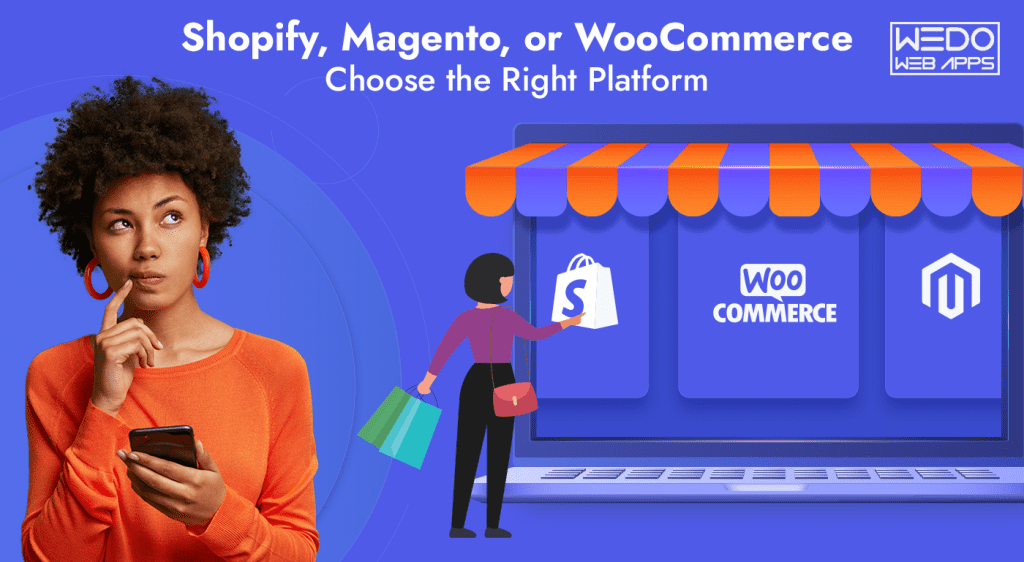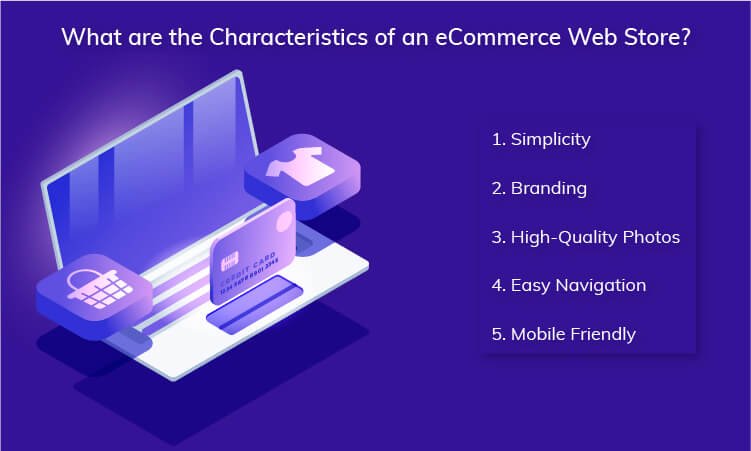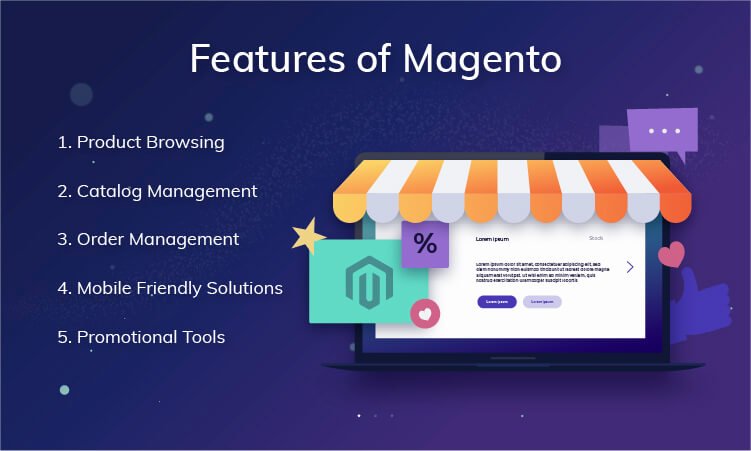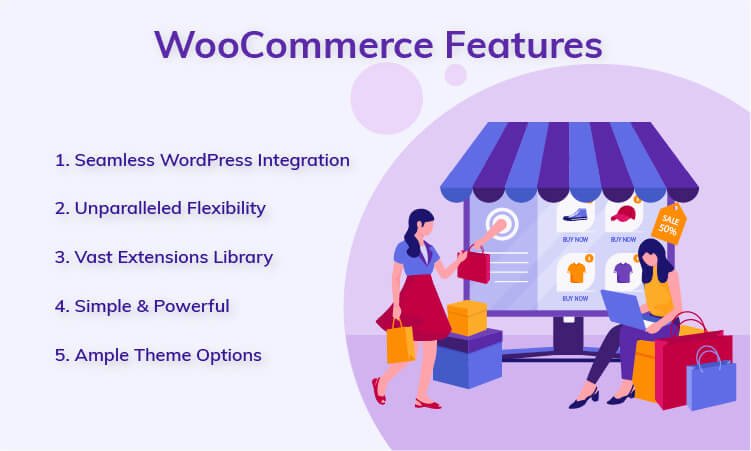5 Oct, 2022 | ecommerce development company
Shopify, Magento, or WooCommerce – Choose the Right Platform

What is an eCommerce Website?
An eCommerce or electronic commerce website allows you to buy or sell your products or services on the web. In other words, eCommerce websites are the online portals that facilitate you to buy or sell your offerings over the internet.What are the Characteristics of an eCommerce Web Store?
Since there are many websites present on the World Wide Web these days, customers are loaded with the options for online shopping. So, to attract customers to your online store, you need to provide an excellent user experience to convince your customers to buy from you. In addition, you need to build trust in them that your products are worth buying. Therefore, here we are with specific characteristics of an eCommerce store, including those which will make your website look appealing.
Therefore, here we are with specific characteristics of an eCommerce store, including those which will make your website look appealing. 1. Simplicity
The main focus of a website should be on the products rather than on extravagant design. An excessive website design for no legitimate reason can only do harm but no good to your business. It will distract the customers from the products on your site. Simplicity in design helps in enhancing the user experience. Therefore, designing a website that is simple and easy to use makes more sales.2. Branding
Most online shoppers prefer to buy products from the top brands in the market. Therefore, it is essential to establish a brand name not only in the online market but also in the offline market. In case you sell both online and offline, a website is just one part of the overall branding. It should operate well with other branding efforts in order to make your customers feel that the website is safe. If you are a startup, branding must be a long-term goal as you don't have the advantage of trusted customers.3. High-Quality Photos and Images
Selling online is way more different than selling offline. The customer cannot physically touch the product. It is a big thing to buy a product without touching it; therefore, you need to build trust for quality. Providing quality images and videos that exactly mirror the product can help overcome this challenge and help the visitors make their decision easily. The product photo is important as the customer will judge your product and your company just by seeing the product image.4. Easy Navigation
The very first requirement of buying or selling a product/service is that the customers should be able to find what they are looking for. Easy navigation is vital for any website, but it is especially crucial for online storefronts. Lost visitors will eventually result in decreased sales; therefore, every effort should be made to make the website clean and easy to navigate. Read also: How Shopify Web App Development can Increase your profit!5. Mobile Friendly
Nowadays, around 60% of the people prefer mobile phones for online shopping. However, suppose you have a website that works well on a PC or laptop but is not compatible with mobile devices. Now what? The mobile customers will go and look for other websites to buy what they want. Therefore, a website should be compatible with all types of screens, be it laptops, PCs, tablets, or mobile phones. This will ultimately help you gain more customers and increase sales which is the primary concern of an eCommerce website.Why do Businesses Need eCommerce Websites?
An eCommerce website has become the most vital part of your business plan in the rapidly growing global economy. The increased amount of online shoppers is the powerful catalyst for eCommerce development. If you are still confused about launching your online store, ask yourself why eCommerce is so much in trend around the world. Here, you will find various benefits of developing an online store.1. eCommerce Helps in Cost Reduction
If you have an online store, it is not necessary to have all the products available to you in physical space. In fact, there are various companies that operate on the World Wide Web, where they show all their products through their eCommerce store. This implies saving money not only by renting or purchasing a premises, but also internet, electricity, etc. On the other hand, if you still want to have a physical store for your customers to come and visit, it should not necessarily be that large. In either case, you will be saving your money.2. eCommerce Platforms help Businesses Go Global
In connection to the above point, eCommerce platforms allow you to post your products for sale anywhere worldwide. Therefore, the customers will not need to travel to your place to see what you offer. If you have a physical store, you will be limited to your geographical area, whereas by having an online store, you will have the opportunity to grow your customer outreach. Furthermore, it will eliminate all your geographical and linguistic barriers. Your eCommerce store translated into different languages will allow the customers to buy from other areas of the world.3. Increase in Sales
eCommerce is mainly focused on one thing that is increasing sales. At the end of the day, the primary purpose of your eCommerce store is to sell more, and therefore this is what it is aimed at. Having an eCommerce store will ultimately increase your business reach, improve your products thanks to the customer reviews, or be available all round the clock.4. Maximum Security of Transactions
Today, shopping over the internet has become more safer than a physical store. You can sit back at your home with nobody spying over the secret number of your online transactions. Of Course, the online storefronts will have SSL certificates. This certificate not only allows safe shopping but also keeps your data encrypted in a way that it is absolutely safe to enter passcodes and keys. It also protects even more confidential data, such as your credit card information. Security will continue to be the most significant concern in the near future, and eCommerce stores are absolutely safe to shop at.5. You can Easily Receive Feedbacks on the Products
You might have always wanted to know what your customers think of your product so that you can improve where you lack. One of the greatest advantages of having an eCommerce store is that you can ask your customers to leave genuine feedback on your website. Additionally, customer feedback will build trust in your current and upcoming customers. The more positive feedback you get, the more customers believe in your store, and ultimately more will be the purchase. eCommerce reviews are kind of a channel where the customers can see what they can expect from your website. So, this was all about eCommerce and its importance. Now let us come to our main focus point, i.e., Which platform is the best for eCommerce web design and development. Before getting into the detailed comparison, let's look at the brief application of each platform. Shopify is a subscription-based eCommerce platform with more than 1000 apps to add various functionalities to your website. Magento is appropriate for enterprise-grade businesses and can host multiple websites with just one admin panel. It also includes various plugins and tools free and paid. Talking about WooCommerce, it is suitable for SMEs. It can create a web store from scratch by just using WordPress. To create an enticing eCommerce store, we would suggest you hire a website design company. A web design agency can ensure a website that includes everything you want in your store. Cannot decide between Magento, Shopify, and WooCommerce? You are not the only one; each and every business faces this situation while developing an eCommerce store. These three platforms are the most popular eCommerce platforms in the industry today. Let's read further to clear your confusion and let you select the best. Read more: Grow your E-Commerce business with best Woocommerce Development ServicesShopify Overview
Founded in 2006, Tobias Lütke, Daniel Weinand, and Scott Lake launched Shopify after the attempt of opening Snowdevil. Snowdevil is a web store for snowboarding equipment. From just five people in a coffee shop, Shopify has grown to approximately 5000 people across the globe. Till 2009, Shopify powered more than 1 million stores in over 175 countries. With this rapid growth, Shopify became the most popular platform to start, run, and grow your business. It offers online businesses a wide range of services like payments, marketing, shipping, and customer engagement tools. These features simplify the process of running an online store for small businesses. Whether a jewelry designer, musician selling mixtapes, or a business looking to grow, with Shopify, you can sell anything you want. The sky's the limit to what you can sell on this platform. In addition, Shopify offers numerous features that will improve your web store.Features of Shopify

1. SEO
Search Engine Optimization is a fundamental requirement for all online business owners. This helps improve search engine ranking and visibility and thereby driving more traffic and customers to your website. Shopify comes with several SEO tools that help website owners appeal to search engines while they are busy working on other features of the website.2. Securit
Shopify is capable of handling hacker protection, security compliances, and upgrades. This will allow you to focus on raising money and conversion rate. Also, you would be able to access dedicated support whenever you face any problem. The support team provides valuable assistance to the startup that wants a solution with no or fewer expenses.3. Analytical Tools
You can also keep track of the website's progress with Shopify's Analytical Tools. Through this feature, business owners can actually track how the visitors located them online and other helpful information that can help them enhance their marketing efforts.4. Hassle-free customization
Business owners with less or no technical knowledge can also use Shopify to develop a high-quality web store. This is all because of its easy customization features. It is extremely simple and convenient to set up an online web store with Shopify's interface. It also includes guides and instructions to facilitate the development of a user-friendly website design.5. Integration
There are many business owners that rely on third-party software tools to ease their business processes. Shopify provides you the convenience of integrating useful tools like WooCommerce, MailChimp. This helps businesses streamline the entire work process, thereby eliminating the hassle of individually accessing the different programs. Since each and every website development platform has specific benefits and drawbacks, therefore, let's discuss Shopify's pros and cons to get a clear idea about whether to use Shopify or not.Strengths of Shopify
1. Built-in Tools
Shopify offers top-notch in-built tools for finding products to sell, creating your website, marketing your products, and many more. If you are a budding startup, you can keep your investment down by using Shopify's free tools. With these extensive free tools, businesses can have a better Point of sale for a more profitable business.2. Easy to Configure and Setup
Shopify offers the convenience of quickly opening a web store with no extra cost. Since all the features are conversion-optimized, the user interface is tidy, user-friendly, and easily understandable. Shopify offers a 14-day free trial in which you can learn the features. The trial period does not ask for any coding experience. On the Shopify website, you can find the documentation and the video tutorials for your reference. If that doesn't work within your skill set, you can ask for help from responsive website development companies.3. Ease of Use
Shopify is an easy-to-use and robust website development platform. This enables you to create and launch your eCommerce website in a minimal time. If you are looking for a customized design, then the development can go for a few weeks. If you are a non-tech person, hire web design firms as per your needs.Drawback of Shopify
1. Not for Long Run
It is not easy to move your eCommerce store to a different platform. Because of this, choosing an eCommerce platform becomes tricky as you have to plan for the future. No doubt, you can use Shopify, but for a business that wishes to manage everything, it is better to move to a self-hosted platform.2. Shopify Pricing
Shopify Storefront owners depend on the add-on features that advance Shopify plans and offers. The free version of Shopify only gives the basic features. So for advanced plans and built-in tools, you need to pay a higher cost. The pricing plan of Shopify or any other hosted platform will eventually become expensive. In general, Shopify is an effective eCommerce platform, but in the end, the decision falls as per the company's needs.Magento Overview
Magento - An open-source eCommerce platform developed by Varien Inc., is now known as Magento Inc. It is a very useful platform for businesses looking to grow online. It is a scalable eCommerce platform and has many control options. This helps the developers build user-friendly and search engine-friendly websites. Magento was first launched on March 31, 2008, as an open-source eCommerce software. Till then, it has helped small business organizations build online businesses. It offers searching and sorting of products in several seamless ways. In addition, it is easily integrated with various third-party sites that are needed to run an online business effectively. Magento is one of the best eCommerce platforms in the web development industry. This is a PHP-based software that provides several features and an easy user interface. In addition, it offers almost all the facets required for an eCommerce solution to be successful. These facets include managing products, catalogs, and orders, along with marketing and promotion.Features of Magento

1. Product Browsing
Suppose you visit a website that is having a bad user experience, and you fail to find the product you wanted. Would you continue browsing on the same website? No, Right? Therefore, Magento provides functionalities that help you deliver an enhanced user experience to your customers. The functions include zoom-in and zoom-out on the image, multiple product images, wishlist addition, and many more.2. Catalog Management
No matter what you are selling, the catalog of your web store holds absolute importance. Magento is a comprehensive platform that helps you in various ways. For example, you can showcase your products virtually, edit and delete product reviews, inventory management, and many more. It also supports sharing the products on social media. Avail of web design services from us if you are looking for a professional Magento eCommerce website.3. Order Management
Magento also offers the feature of Order Management of your eCommerce website. This feature includes viewing, creating, and editing the products from the admin panel. Some of the advanced features include Multiple invoice printing, email notifications, call-center support, and RSS feed for new orders. Also, customization of the order status can be availed with Magento.4. Mobile-Friendly Solutions
We all know that more than 60% of online shoppers prefer shopping from their mobile devices. And with Magento, you can attract this vast demographic of mobile users. Building mobile-friendly websites and applications with Magento is a seamless process. It offers mobile HTML5 for creating mobile-compatible eCommerce stores.5. Marketing and Promotional Tools
Magento also offers various promotional and marketing tools, which makes your advertising and marketing accessible. This Magento feature offers up-selling and cross-selling products, promotional pricing, free shipping, and monitoring coupon usage. Hence, Magento helps you to promote your products easily. Magento is one of the biggest eCommerce platforms. Just like Shopify and WooCommerce, Magento has hundreds of web stores worldwide. However, being the most responsive web design service, we have seen some of the strengths and failings of Magento. Here we go!Advantages of Magento
1. Highest Flexibility
Magento allows you to start selling your products or services with just a primary shop. However, when it grows, its design becomes quite challenging. For Magento, flexibility is crucial; hence its plans are designed to increase its progressions. Furthermore, due to its open-source nature, we could modify the source code as per our needs and desires.2. Large Community of Users
Magento has a large community of users because it is the most used eCommerce website development platform worldwide. This community of users always ensures quick support. Moreover, they are motivated to develop numerous plugins and extensions. Therefore, if you have any issue related to Magento, you are more likely to get quick support as there is a massive community of Magento users.3. Magento Unique features that other platforms lack
Magento has a variety of features helping you manage multiple stores, allow multiple locations, currencies, language, and pricing. Compare any other platform with Magento, and it will definitely stand out with its ample features. For example, with Magento, you can set up the product price according to a group of people. You can keep different prices for your staff, regular customers, and VIPs, respectively. Additionally, with the community version of Magento, you can enjoy various features that other eCommerce platforms lack.Disadvantages of Magento
1. It's Expensive
Magento has many versions, the community version is free, and the enterprise version costs you more than approximately $15,000. Furthermore, the premier Magento version of which is targeted at large businesses, costs you more than approximately $22000 per annum. Add an extra third-party fee if you are unable to install the extension by yourself. Hence, Magento is way too expensive.2. Time Consuming
This eCommerce platform is time-consuming as it has a slow loading time. Therefore, it isn't easy to customize your website in Magento as compared to other eCommerce platforms. In addition, it is not easy to migrate from another eCommerce platform to Magento as it imports data at a prolonged rate. Due to its flexible architecture, it becomes complex and time-consuming to set up a Magento store. This is one of the reasons behind the slow loading time of the Magento platform.WooCommerce Overview
WooCommerce is a free plugin for WordPress and has been downloaded around 3.9 million times by January 2020 worldwide. WooCommerce operates approximately over 37% of the websites on the world wide web. It was primarily developed by the WordPress Theme Developer WooThemes. WooThemes further hired developers, namely Mike Jolley and James Koster at Jigowatt, to work on Jigoshop that ultimately became WooCommerce. When WooCommerce is integrated into a WordPress website, it adds basic functionalities to it such as product management and shopping cart.. WooCommerce can help you develop a basic online store that can sell a variety of products and services. You can sell physical goods, digital goods, ongoing membership, and affiliate transactions. WooCommerce can manage various essential features like inventory management, international customers, sales tax management, coupons, and shipping cost calculation.WooCommerce Features

1. Seamless WordPress Integration
The significant advantage of choosing WooCommerce is that it is developed on the most popular CMS worldwide - WordPress. As a result, the concepts that work on WordPress also work the same on WooCommerce. Since using WordPress is so easy, the integration of WooCommerce with WordPress makes a website owner's work much easier.2. Unparalleled Flexibility
Whether you are selling physical products, virtual products, or even if you are working with external/affiliate products, WooCommerce is the right choice for you. You can easily customize WooCommerce to sell any kind of product/service. The best part of WooCommerce is that you don't have to be technically strong to customize it.3. Vast Extensions Library
If you are planning to build an eCommerce store, you need a lot more than just a website and products. You need to set up shipping, payments, marketing, accounts, and a whole lot of things. WooCommerce comes with a massive variety of extensions that makes the website functionality much easier. WooCommerce extensions library comprises more than 400 extensions.4. Simple & Powerful
Even Though WooCommerce is a small platform, it does not only target developing small stores. With WooCommerce, you can even create professional storefronts. With the robust in-built tools, you can do a lot of things like managing orders, updating delivery status, and many more. In all, WooCommerce has everything that is needed in a professional web store.5. Ample Theme Options
Have you seen two Bath and Body Works stores? You haven't, right? Similarly, there cannot be two stores that are exactly the same. To stand out from your peers, you need to develop a store that is unique and speaks your own story. WooCommerce is compatible with WordPress themes. Now that we know the features of WooCommerce let us now discuss the advantages and disadvantages of WooCommerce. Read further to learn more.Advantages of WooCommerce
1. Great Flexibility
One of the major reasons for using WooCommerce is you can sell any kind of product regardless of your business niche. You can sell physical products, virtual products like downloadable novels, external products, and more. It also offers flexibility that allows businesses of all types and sizes to set up a store. You won't have to worry about your business expanding past plugin capabilities.2. Maximum Security
WooCommerce being an online platform, must have secure payment gateways in place. This should be done to ensure that your customer's credentials are not compromised. WooCommerce comes with secure payment gateways like Stripe and PayPal. Because of the popularity of this platform, hackers constantly try to target it. WooCommerce developers keep updating the platform regularly in order to prevent it from cyber-attacks. However, the plugin does not come with a backup facility to restore the data in case the attack is successful. With WooCommerce, you can add a backup that will keep the customer data stored in an encrypted form.3. Infinite Customization Options
WooCommerce helps you develop a website that is specific to your business niche. It has limitless free plugins available on the WordPress Plugin Directory. If you want the paid versions, you can find them on WooCommerce.com and Codecanyon. Even though the free themes are limitless and impressive, if you don't find a theme to suit your business, you can choose the one that is similar and customize it according to your business niche. One of the huge benefits of using WooCommerce is that you don't need to be technically strong. WooCommerce Wizard allows you to create a site with no knowledge in HTML and CSS.Disadvantages of WooCommerce
1. It's WordPress Specific
Even Though WooCommerce has many advantages, it is still a plugin. Therefore, you cannot use it in websites that are not hosted by WordPress. This thing makes it difficult for the businesses who want to use WooCommerce but have a website on some other platform. They will need to migrate their website to WordPress for WooCommerce.2. Not a Cost-Effective Solution
While it is free to download and install WooCommerce, some extensions may require payment to make your website work at a suitable capacity. This is the most significant disadvantage of WooCommerce as it feels like there are hidden costs for business owners. Let's say you want a payment gateway other than Paypal; for that, you will have to pay a bill. In addition, various extensions will require subscriptions that means you will have to deal with those every year. These subscriptions may cost you anywhere from $39 - $249, depending on how advanced you want your store to be. It looks like you've gained enough knowledge about all three platforms. Congratulations! You've cleared a critical step. But a lot of things might confuse you to choose a platform for your website development. The very first thing may be which eCommerce platform you should start your business with. This year everyone seemed to be tempted with Magento; earlier, it was WooCommerce and Shopify. The more you speak with the website design companies or the marketing companies, the more confused you will be. All three platforms have billion-dollar companies behind them, which will assure you of getting updated and enhanced with time. Since all the three are well supported and famous, all have an intense competition when it comes to choosing one. Shopify offers the easiest way to start your online business but compromising the flexibility, Magento provides enterprise-level flexibility but for the sake of ease of use. However, WooCommerce sits somewhere in the middle of both platforms, offering a significant amount of flexibility while staying easy to use. Confused about which platform you should go with? Let's carry on with a detailed comparison between the three platforms to help you choose the most appropriate one for your website development.Magento vs. Shopify
Magento and Shopify both are eCommerce platforms, and both offer us exorbitant products. As such, both these platforms should be in close competition with each other, right? Absolutely Not. The reason it would be unfair to compare these two platforms is that both platforms serve different parts of the industry. Magento vs. Shopify would be like matching a fresher programmer with an experienced one - same platform, different experience. Nonetheless, both have their own value in the market. Shopify is preferred over Magento because it has more affordable pricing, comprehensive out-of-the-box functionalities, and numerous built-in themes. At the same time, there are many who choose Magento over Shopify because of its open-source nature, endless flexibility, outstanding features, and a massive dedicated community. Shopify is the perfect eCommerce solution for beginners or people with no prior coding experience. On the other hand, Magento is appropriate for experienced developers and businesses who have been in the eCommerce industry for a very long time. When you plan to build on Magento, it will require more human work, and assume that you have prior coding knowledge.Shopify vs. WooCommerce
Shopify is superior to WooCommerce as it offers specific features at each subscription stage, out-of-the-box rich features, and requires no coding skills. Whereas you should consider WooCommerce over Shopify because it has powerful SEO functionality, ample plugins, add-ons to choose from, and most importantly, rich customization potential to meet your business needs. Both Shopify and WooCommerce are good eCommerce website development solutions. However, the choice comes down to individuals' preference and their business requirements. If you want a user-friendly, plug 'n' play solution and less customization, Shopify would be the perfect fit for your web design. But if you are an experienced WordPress user looking for a flexible eCommerce platform, WooCommerce would be a great and lucrative option. It comes with varying costs approved by stand-alone applications as well as extensions.Magento vs. WooCommerce
Just like we compared Magento and Shopify, the comparison between Magento and WooCommerce also falls under the same class. This makes the selection between the two relatively easy. Just choose one that suits your business requirements. Both the platforms require prior experience and knowledge, and it can be expensive to set up a web store with these two. As such, if you are comparing Magento and WooCommerce, it's the debate about business needs, not the capabilities. Magento is suitable for large businesses looking for a better and more customized solution built from scratch. And also to the companies who are not afraid to invest their time, money, and efforts. WooCommerce will be best for small companies or budding startups looking for a cost-effective eCommerce web solution. While WooCommerce requires some pre-knowledge of WordPress, it is more suitable for beginners as compared to Magento.Shopify vs. WooCommerce vs. Magento
Now that we have seen the detailed description of each platform individually and have also compared them with each other, it is clear that all three have their target audience and strengths. Shopify is an eCommerce platform that is suitable for small businesses looking for an eCommerce solution without investing too much time, effort, and money. For businesses that are already running a WordPress website but are looking for a more flexible and enriched eCommerce functionality, WooCommerce is an excellent way to go. Magento is the best solution for medium and enterprise-level businesses who are looking for a comprehensive and tailored eCommerce solution absolutely from scratch.Final Words
Having analyzed WooCommerce, Shopify, and Magento, the biggest question that arises is - Which Platform to Choose? This is often the case in such questions, and the simple answer to these questions is - It Depends! There are a lot of factors that are to be considered while choosing an eCommerce platform for your website. For example, your technical skills, size of the store, features required, and also budget, all these factors help you decide which eCommerce platform is perfect for your online business.There are three scenarios where there is a clear answer to this question.
- You have fewer technical skills and want to quickly launch your store with minimum fuss, go with Shopify.
- You have a great budget and want the most perfect solution to launch an enterprise eCommerce solution, go with Magento.
- You are interested in learning new things for yourself and want a solution that will grow your business without restricting its potential, WooCommerce is for you.
Frequently Asked Questions
Shopify is a more user-friendly and streamlined platform, with a focus on simplicity and ease of use. Magento is a more customizable and scalable platform, with a wider range of customization options and flexibility for developers. WooCommerce is a plugin for WordPress that offers a range of e-commerce features and tools.
Businesses should consider factors like their specific needs and objectives, budget, level of customization required, and technical expertise when choosing between Shopify, Magento, and WooCommerce. They should also evaluate the features and tools offered by each platform and prioritize scalability and flexibility for future growth.
Benefits of using Shopify, Magento, and WooCommerce for e-commerce website development include a range of customization options, scalability, and strong support for SEO and marketing. Each platform also provides access to new features and tools for managing inventory, processing payments, and marketing products.
WeDoWebApps can help businesses choose the right platform for their e-commerce website development needs by conducting thorough research and analysis of the client's industry and competitors, evaluating the specific needs and objectives of the business, and providing customized recommendations for the most effective platform based on these factors.

